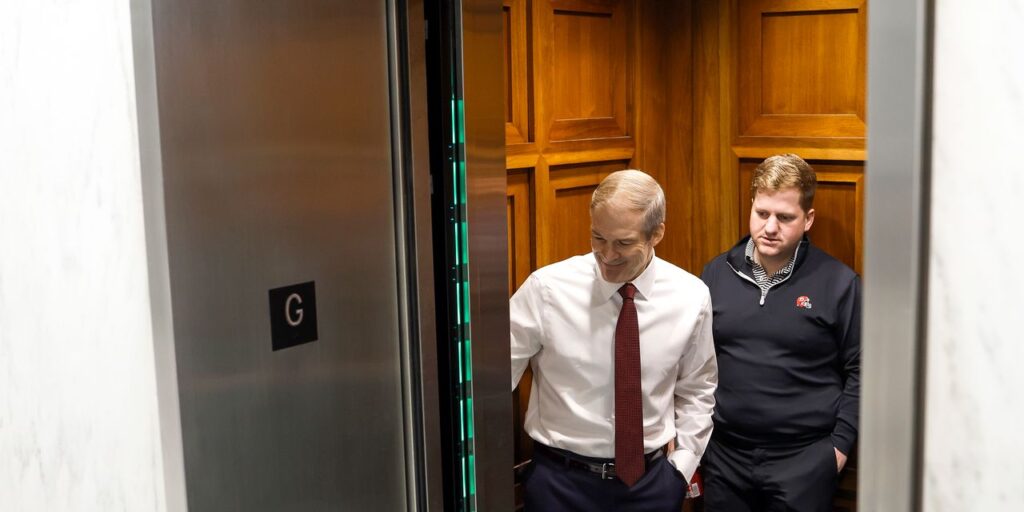Rep. Jim Jordan made progress Monday in his push to become the next speaker of the House of Representatives, winning endorsements from some fellow Republicans who just last week had refused to back him.
The narrowly divided chamber of Congress is expected to vote around noon Eastern Tuesday to select a speaker, with the move coming after former Speaker Kevin McCarthy was ousted two weeks ago and after No. 2 House Republican Steve Scalise ended his bid for the post last week.
GOP Rep. Ann Wagner of Missouri, who previously said a Jordan speakership was a non-starter for her, switched her stance on Monday. She said in a post on X that her colleague from Ohio “has allayed my concerns about keeping the government open with conservative funding, the need for strong border security, our need for consistent international support in times of war and unrest … as well as the need for stronger protections against the scourge of human trafficking and child exploitation.”
Similarly, GOP Rep. Mike Rogers of Alabama, who chairs the House Armed Services Committee, announced in a post on X that he was backing Jordan after saying last week that there was nothing that Jordan could do to win his support. Rogers pointed to an accord on an annual Pentagon bill, the National Defense Authorization Act, saying he and Jordan had “agreed on the need for Congress to pass a strong NDAA, appropriations to fund our government’s vital functions, and other important legislation like the Farm Bill.”
Republican Rep. Vern Buchanan of Florida offered his support for Jordan as well on Monday, though he noted that he’s “deeply frustrated by the way this process has played out.” Another endorsement came from GOP Rep. Ken Calvert of California, who chairs the House Appropriations Committee’s defense subpanel.
Jordan — who has been endorsed by former President Donald Trump — sent a letter to his colleagues in which he called for coming together after a chaotic two weeks, saying: “It is time we unite to get back to work on behalf of the American people.” The congressman, a co-founder of the hardline House Freedom Caucus and chairman of the House Judiciary Committee, also told CNN that he was confident about Tuesday’s vote, saying: “I feel good about it.”
Analysts have been warning that the process of finding a replacement for McCarthy is preventing the House from addressing crucial matters, such as avoiding a government shutdown next month and supporting Israel in its war against Hamas.
House Republicans made Jordan their nominee for speaker on Friday, but he drew just 124 votes while 81 lawmakers backed another candidate for speaker, GOP Rep. Austin Scott of Georgia. In another round of voting on Friday, Jordan still had 55 colleagues voting against him, but he now appears to be flipping some of them to his side.
One betting market, Smarkets, was giving Jordan a 33% chance of becoming speaker.
Spending cuts and shutdown coming?
Having Jordan as speaker could mean a 1% cut in defense
ITA
and non-defense spending, noted Philip Wallach, senior fellow at the American Enterprise Institute, a conservative think tank. That’s because this year’s debt-limit deal includes a provision that calls for such reductions if there aren’t bipartisan agreements on a dozen funding bills before Jan. 1 and instead a reliance on short-term measures known as continuing resolutions, or CRs.
“It is now clear,” Wallach said during an AEI event on Monday, that Jordan’s “plan is to have us live off continuing resolutions and implement this 1% cut.”
“That’s a concrete thing where he could say, ‘Well, we’re moving in the right direction. We’ve taken a hard stand,’” the AEI expert added.
The CEO of one financial advisory firm also sees standoffs in the future.
“We expect the next U.S. speaker will be less inclined to make deals than McCarthy; in many ways it makes more sense for them, politically, not to be a deal-maker in the current environment,” said deVere Group’s Nigel Green in a statement.
“We believe that a U.S. government shutdown is now more likely with a new speaker of the House, and this has the potential to create a domino effect in global financial markets
SPX.
”
BTIG analysts Isaac Boltansky and Isabel Bandoroff said the speaker drama suggests that next year’s election will also be full of twists and turns.
“We have followed every twist and turn of the speakership race, and there is only one takeaway we can share with absolute certainty: This confirms that the 2024 election cycle will be exhausting, volatile, and just downright weird from beginning to end,” they wrote in a note.
U.S. stocks
DJIA
COMP
closed higher Monday, as investors looked ahead to earnings season and unwound the flight-to-safety trades seen last week on fears the Israel-Hamas war could escalate into a wider conflict.
Read the full article here











